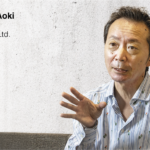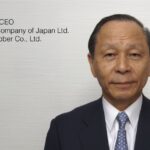GK sat down with Tokiko Inoue, the president of bag manufacturer Inoya. Famed for its ‘master-piece’ brand amongst other high-quality lines, Inoya is dedicated to passing on skills to the next generation of craftspeople, as well as fostering a new fan base around the world.
Across many different areas of fashion, from bags to high-end garments, what do you believe is the aspect that sets Japanese designers apart from the rest of the world?
I don’t know if we are special, but I believe this mindset is deeply rooted in our national culture. Growing up, I experienced the qualities that make many brands popular, both from the West and Japan. Traditionally, Japanese craftsmanship values attention to detail and consideration for others. For example, when it comes to bags, they are not just about carrying items—design is, of course, important, but so is enhancing functionality and convenience.
In recent years, with an aging workforce and a declining population, securing skilled human resources has become a major challenge. We believe it is essential to return to the fundamental principle of putting people first—ensuring that their skills are passed on to the next generation. Before the COVID-19 pandemic, affordable mass-produced bags were in high demand. However, with the recent depreciation of the yen, they are not selling as well, presenting an opportunity for us to reevaluate our identity.
How is the increased awareness surrounding sustainability affecting your operations?
In the fashion industry as a whole, traditional production methods are often highly wasteful. For example, clothing is produced at low cost, and unsold items are simply discarded. Recently, there has been a growing shift toward higher quality, reduced production, and limited inventory. Consumers are also increasingly seeking repair services to extend the lifespan of products and minimize waste.
In our case, we are consolidating our production capacity in Japan while simultaneously training a new generation of craftspeople. We believe this approach can play a fundamental role in advancing the Sustainable Development Goals (SDGs).
Have you identified a specific product or business practice that is a particular growth driver for your company?
Of course, our bestseller is our ‘master-piece’ brand, and due to its popularity, we have spun it off as a subsidiary. Sales for this brand have rebounded after the pandemic and will continue to strengthen in the future. For our ‘SLOW’ brand we value simple designs and natural materials, meaning that the consumer can have a strong affection for the item for longer. Being a sustainability-focused brand, we hope to expand sales more for this in the future too.
The master-piece brand has been exhibiting in Paris for over 20 years consecutively and currently is there now for Paris Fashion Week. The continuity has allowed us to build a strong, trustworthy relationships with our clients. Also, we have a dedicated sales agent in the Netherlands, covering the Europeans and North American markets.
What is your plan for further internationalization?
So far, we have not decided to increase overseas sales, rather, our focus will be on improving the quality of our craftmanship here in Japan. To fulfil growing orders, we have to ensure that we have a base that supports quality, here in Japan. One shift will be to focus our branding strategy on a customer-based approach. With our own manufacturing speed, we hope to be able to foster a new fan base, growing from our existing fans around the world.









